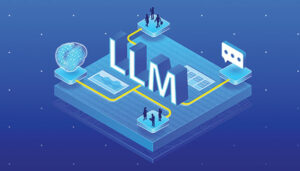In this blog, we summarize the key points from a recent article from David McGeough at Scorebuddy where he explored the difference between public and private AI options, and show you why private LLMs are the future for customer service – and your business.
AI has changed the way businesses operate, especially in customer service. Many call centres are now using AI to improve how they work, with 45% of support teams already on board.
Large language models (LLM) like ChatGPT have brought new possibilities, allowing call centres to do things they couldn’t before. However, these advancements have also raised concerns about security, privacy, and copyright, showing that while AI brings benefits, it also comes with challenges.
Understanding LLMs
What Is an LLM?
LLMs, or Large Language Models, are advanced AI systems designed to comprehend and generate human language with remarkable accuracy.
Panos Karagiannis, CEO of Moveo.ai, describes LLMs as neural networks proficient in language understanding and generation.
These models are built on intricate neural networks and are trained on vast amounts of text data, enabling them to produce responses that closely mimic human communication.
The core of LLMs lies in their transformer architecture, which manages long-range text dependencies. This architecture consists of multiple neural network layers that analyze and generate language by learning from patterns and relationships within large-scale text datasets.
This technology powers well-known AI tools like Google’s Gemini, Anthropic’s Claude, and OpenAI’s ChatGPT, which have significantly impacted various industries by generating coherent, humanlike text for diverse applications, including customer service.
Public vs. Private LLMs
Public AI models, like ChatGPT, are widely recognized and used by many. However, these models have limitations, such as potential data privacy concerns and less customization.
This has led to the development of private LLMs, which offer similar functionality but with enhanced control and customization.
Private LLMs are models that businesses can train and manage internally, allowing them to tailor the AI to their specific needs. Key advantages include:
- Security: Full control over the data used to train the model ensures higher confidentiality and compliance with data regulations.
- Customization: The ability to fine-tune the model for specific industry jargon and business operations results in more accurate and context-aware responses.
- Cost: Although initial setup costs may be high, long-term benefits in efficiency and customer satisfaction can outweigh these expenses.
In contrast, public LLMs are pre-trained on broad datasets and are more general-purpose. They are accessible via APIs and web interfaces, making them easier to implement and more cost-effective for businesses that cannot afford to develop their own models. However, they pose risks such as data privacy issues, limited customization, and potential inaccuracies due to their generalist nature.
Advantages of Private LLMs in Customer Service
Private LLMs offer significant benefits for enhancing customer service operations. Key reasons to consider integrating a private LLM include:
1. Enhanced Data Security and Privacy
Private LLMs minimize the risk of data breaches by operating on secure infrastructure, ensuring compliance with privacy regulations like GDPR and CCPA.
2. Improved Accuracy and Fewer Hallucinations
By training on specific datasets relevant to the business, private LLMs provide more accurate responses, reducing the risk of AI-generated errors or nonsensical answers.
3. Unmatched Control and Customization
Businesses can customize private LLMs to reflect their unique needs, from brand voice to specialized knowledge, resulting in more personalized and effective customer interactions.
4. Faster Response Times
Private LLMs, optimized for specific use cases, can deliver responses more quickly than public models, improving customer satisfaction.
5. Long-Term Cost Efficiency
While private LLMs require a higher upfront investment, they eliminate ongoing subscription fees and improve operational efficiency, leading to better ROI over time.
Use Cases for Private LLMs in Customer Service
Private LLMs can transform customer service operations in several ways, including:
- Handling Repetitive Queries: Automating responses to common customer questions frees up agents to focus on more complex issues, improving efficiency and consistency.
- Providing Personalized Responses: Private LLMs analyze customer data to deliver tailored responses, enhancing the customer experience with more relevant solutions.
- Upselling and Cross-Selling: These models can suggest relevant products or services based on customer interactions, driving additional revenue opportunities.
- Automating Quality Assurance: Private LLMs can monitor and evaluate customer interactions, providing insights into agent performance and ensuring consistent quality.
Overcoming Challenges in Implementing Private LLMs
Implementing a private LLM in a contact centre requires careful planning to overcome potential challenges:
- Data Governance and Accessibility: Establish strict data governance policies to ensure the LLM has access to clean, relevant data for effective learning and response generation.
- Start Small and Scale Up: Begin with smaller pilot projects to manage risks and fine-tune the AI’s performance before scaling up.
- Robust QA Process: Maintain a strong quality assurance process to ensure the LLM continues to deliver accurate and consistent results.
- Selecting the Right Vendor and Use Case: Choose a vendor with proven experience in AI and call center technology, and ensure the use case aligns with business goals for maximum ROI.
The Importance of QA in AI-Powered Customer Service
As AI continues to transform customer service, ensuring the accuracy and consistency of AI implementations is crucial.
Private LLMs offer enhanced data security, customization, and efficiency, making them a valuable asset for businesses.
However, a solid quality assurance foundation is essential to maximize the benefits and mitigate risks associated with AI in customer service.
This blog post has been re-published by kind permission of Scorebuddy – View the Original Article
For more information about Scorebuddy - visit the Scorebuddy Website
Call Centre Helper is not responsible for the content of these guest blog posts. The opinions expressed in this article are those of the author, and do not necessarily reflect those of Call Centre Helper.
Author: Scorebuddy
Reviewed by: Hannah Swankie
Published On: 27th Aug 2024 - Last modified: 22nd Oct 2024
Read more about - Guest Blogs, David McGeough, Scorebuddy






 Scorebuddy is quality assurance solution for scoring customer service calls, emails and web chat. It is a dedicated, stand-alone staff scoring system based in the cloud, requiring no integration.
Scorebuddy is quality assurance solution for scoring customer service calls, emails and web chat. It is a dedicated, stand-alone staff scoring system based in the cloud, requiring no integration. 









